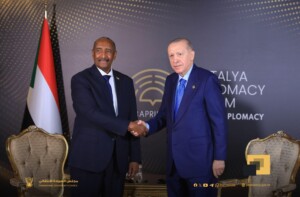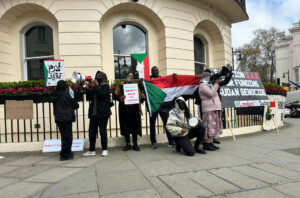Human Rights Watch calls for investigation of police violence in Kassala protests
Yesterday, Human Rights Watch (HRW) called on Sudan’s Attorney General to investigate, and hold accountable, the officers involved in the unlawful use of force during demonstrations in Kassala, last October.
 A march in August for the arrival of Saleh Ammar, the new governor of Kassala (social media).
A march in August for the arrival of Saleh Ammar, the new governor of Kassala (social media).
Yesterday, Human Rights Watch (HRW) called on Sudan’s Attorney General to investigate, and hold accountable, the officers involved in the unlawful use of force during demonstrations in Kassala, last October.
The protests took place in Kassala after Prime Minister Abdallah Hamdok dismissed the governor of Kassala state, Saleh Amar. This followed weeks of unrest throughout eastern Sudan between members of Amar’s Beni Amer tribe and members of the Hadendawa tribe, who opposed his appointment.
The government used live ammunition to disperse protestors, resulting in the killing of seven demonstrators, including a 16-year-old boy, and injuring a further 25 people. Most of them suffered bullet wounds.
In a statement yesterday, HRW said that the Sudanese authorities used “excessive force, including lethal force, against protesters” on October 15th. The organization holds the police and Rapid Support Forces (RSF) responsible for the shooting at the protesters in Kassala and said that those higher up in the chain of command should also be held accountable.
Ida Sawyer, deputy Africa director at HRW, said, ‘‘Sudan's transitional authorities should make it clear that the security forces are not above the law by holding all those who violate the law swiftly and firmly accountable. The Sudanese people should be able to exercise their right to peacefully protest without fear for their lives.’’
HRW said that it had spoken to 11 witnesses, including doctors, about the events in Kassala and that they had reviewed forensic videos, photos and reports.
The organisation expressed its concern about Sudan's excessive dependence on the military and other armed forces to control crowds. HRW wrote to the Attorney General on November 24 to present its conclusions and to request updates and information on the steps taken by the authorities in response to the violence.
This statement was made as an independent national commission started its first in-person investigations on the violence used by government forces against protesters in Khartoum on June 3, 2019, causing the death of at least 127 demonstrators.
Sudan's Attorney General, Tajelsir El Hibir, prohibited police forces in the country from using bullets or tear gas against protestors during the March of the Millions on December 19.
El Hibir recently faced criticism when he suspended and detained multiple public prosecutors after they submitted a memorandum to the Sovereign Council accusing him of committing “grave breaches that amount to criminal offences” and demanding his resignation.
Among the suspended and detained prosecutors were those dealing with the most important prosecution files, including cases of the June 3rd Massacre.
Radio Dabanga’s editorial independence means that we can continue to provide factual updates about political developments to Sudanese and international actors, educate people about how to avoid outbreaks of infectious diseases, and provide a window to the world for those in all corners of Sudan. Support Radio Dabanga for as little as €2.50, the equivalent of a cup of coffee.
.












 and then
and then